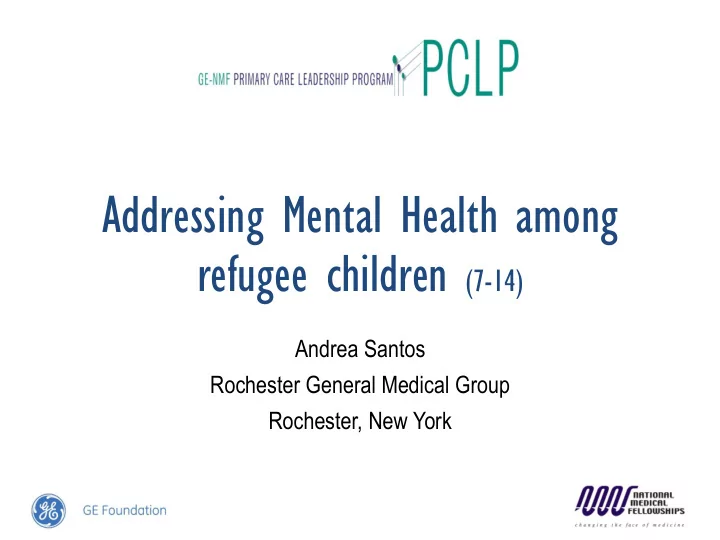

Addressing Mental Health among refugee children (7-14) Andrea Santos Rochester General Medical Group Rochester, New York
Introduction • Address and emphasize the importance of screening/assessing for mental health among refugee children at their primary care office visits and provide recommendations. • How can we improve/change the current system in order to provide holistic, culturally sensitive, quality patient care that addresses mental health in order to provide early interventions and support services to refugee children to help them thrive in our society?
Background • Mental health is often overlooked but correlates with physical health. Poor health outcomes and chronic diseases such as CV disease, diabetes, and cancer have been associated with poor mental health (Galson, 2009). • Mental Health is a public global health issue and should be addressed as such, from a multitude of angles. • In 2013 50% of refugees were under the age of 18, making up the largest proportion of refugees; the highest figure in a decade. • The growing number is a reflection of the growing Syrian, Afghan, and Somali children (UNHCR global trends 2013). • Studies have concluded that PTSD is prevalent, as high as 89%, among children who have experienced war, however, many refugee children do not meet diagnostic criteria for PTSD but other difficulties such as insomnia, nightmares, adjustment disorders, inattention, social withdrawal and somatization issues have been documented. • Consider the stressors these children have endured in their homeland in addition to their resettlement and acculturation process that puts them at an increased risk. Exposure to multiple adversities is a predictor of worse mental health outcomes. • It is crucial for all patients to receive some sort of mental health assessment at their primary care visit, especially vulnerable patients who are at an increased risk in order to help them thrive in our society.
Methodology • My original project was going to focus on the resources & support services (utilization and efficacy) available to refugee children. However, I discovered that there weren’t many specifically available to refugee children. • I then shifted my project to mental health resources and support services. • I quickly learned that there were only two main centers where providers refer patients, Catholic Family Center and Genesee Mental Health Center who provide mental health services, therapists, to refugee children. • When I inquired about screening tools being used to identify mental health issues among refugee children I discovered that refugee children between the ages of 7-14 are not being screened or assessed for mental health issues (unless a concern arises or there is a clear behavioral issue reported by the parent) during their primary care office visit. This also varies among provider. There is no protocol. • I then adjusted this project to focus at a systems level.
Methodology • Naturalistic observation: observing/shadowing Lisa Lyle, FNP in her pediatric refugee primary care practice. • Qualitative research was conducted by conducting individual interviews with multiple staff members: • Lisa Lyle, FNP • Other primary care providers • Rochester’s Health Center pediatric social worker • Genesee Mental Health therapist • Catholic Family Center social worker • Mental health association manager • Pathways to wellness staff
Results • Refugee Children under the age of 14 are not being screened or assessed for mental health issues at the time of their primary care appointment. • There is no screening tool, policy or protocol in place to assess for mental health among refugee children. • Variability and inconsistency among providers • Lack of collaboration between Genesee Mental Health and the refugee health center. • Catholic Family Center is the only center that provides specific resettlement support services to refugees.
Discussion • Why aren’t these children being assessed for mental health? • Barriers/challenges: interpreters (live vs. phone), time constraints, limited resources, limited funding, knowledge deficit, cultural barriers, poor refugee history. • Further research regarding the best screening tool to use for this patient population. • Without appropriate mental health assessments opportunities to provide early support, improvements, protective factors and interventions are missed. • In order to measure improvements we must collect accurate data, assessing all children.
Recommendations • Establish cross-disciplinary coalitions in order to provide quality patient care by collaborating with families, schools, clinicians, and resettlement agency. • Develop systems to diminish current identified barriers/challenges to provide appropriate mental health care to this patient population. • Providers to agree upon and implement a set policy/protocol on how to assess/screen refugee children under the age of 14 (set of questions, simply asking why they left their country, etc.) that works for their practice. • Group of trained specialists to provide mental health services specifically to refugee children. (would providers be more motivated to screen/asses/refer patients if these supportive resources, professionals, existed and were easily accessible?) • Additional training for all clinicians: CEU’s, online modules (web based trainings)
Conclusion • Assess for mental health at all primary care office visits. • Identify the need for early intervention and provide support services. • Can help to prevent behavioral issues, delinquent behaviors, decease drop out rates and substance abuse issues. • Address the current challenges/barriers and provide ideas for solutions in order to improve the current system therefore improving refugee health outcomes. (integrated system, collaboration and appropriate follow up) • Provide holistic quality patient care to all refugee children. • Rochester’s refugee health center is unique and has the ability to be a prospective leader in providing holistic care to refugees. It can serve as an exemplary refugee health center and positively impact future refugee health centers, setting a high standard of care in which other refugee health centers across the nation can model after.
Acknowledgements • Jim Sutton, PA-C • Mary Maher, PhD • Lisa Lyle, FNP • Jennifer Pincus, program coordinator • Danielle Preiss, pathways to wellness liaison • Karen, peer counselor
Recommend
More recommend